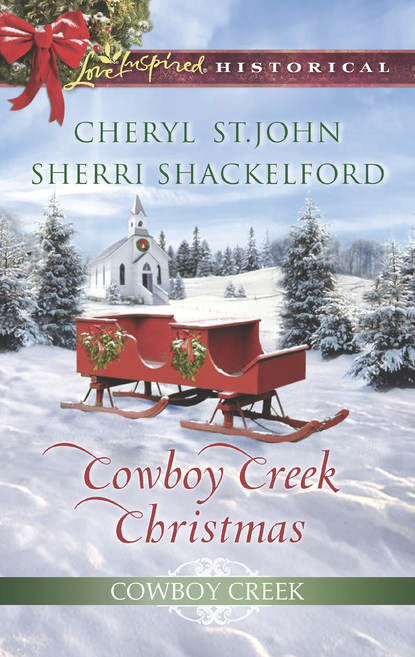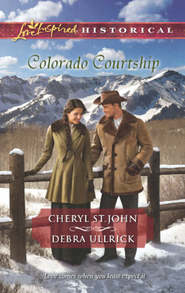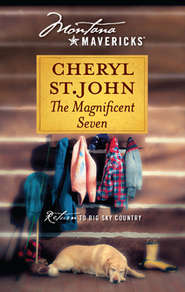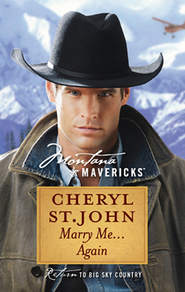По всем вопросам обращайтесь на: info@litportal.ru
(©) 2003-2024.
✖
Cowboy Creek Christmas: Mistletoe Reunion
Настройки чтения
Размер шрифта
Высота строк
Поля
Red Bird looked down at her. His eyes were so obsidian they shone, his dark skin lined from the sun, though he didn’t appear old. He had a broad nose and a long scar from his lower lip across his chin, but in his uniqueness she found him strikingly beautiful.
“Ho’eohe,” he said, and gestured for her to join him. Sam was right there to help her down, and she followed Red Bird toward the encampment. Red Bird spoke to James on the way past.
“Leave the wagon, but bring the supplies,” James said to Sam.
The other Indian men picked up crates as well and followed.
Red Bird led Marlys to the largest tipi, called out before entering and held the flap aside for her. She took a deep breath and followed him into what appeared to be their chief’s dwelling. A man whose long, coarse black hair was shot with steel-gray exchanged words with Red Bird. Red Bird led Marlys forward. “Né’seéstse’hena.”
“Take your coats off,” James interpreted.
The three of them did so, and the chief gestured for them to sit near the fire.
Among those in the tipi was a woman who was perhaps the chief’s wife and two women not much older than Marlys, as well as several children, ranging in ages. All the children sat quietly behind their mothers.
“Éhame.” The chief pointed to Sam.
“Chief Woodrow Black Snake asks if you are her husband,” James explained before he answered for Sam.
Red Bird spoke to Chief Black Snake, and apparently the chief asked to see the contents of Marlys’s crates and burlap bags. The men who had accompanied them displayed the contents.
Marlys explained that the blankets were gifts and that the bundles and jars contained medicine.
The chief sent for someone, and after several minutes a brave helped an aged woman into the tipi. She inspected the herbs and opened jars to sniff and taste, then she spoke to the chief. He signed for her to take a seat, and Red Bird helped her lower herself before the fire. Her cloudy black eyes surveyed the newcomers with keen interest.
The chief directed the two young women, and they brought the guests water, roasted nuts and jerky. Marlys instinctively understood they were being treated as honored guests, and the impoverished Cheyenne’s generosity brought swift tears to her eyes.
She asked James to tell her the Cheyenne word for every item in her sight, even the women and children’s names. The women nodded, and the children smiled shyly when she said their names.
“Néá’ee,” she said, thanking them. “Tell them it’s our pleasure to give them blankets.”
James spoke and got up to take the stack of blankets and place it before the oldest woman. She in turn handed one to each of her daughters or daughters-in-law, kept one for herself and instructed Red Bird to give one to the elderly medicine woman. The old woman touched the plain gray wool and nodded at Marlys. “Néá’ee.”
The chief’s wife spoke to one of her daughters, and the younger woman went to a huge woven basket under the slant of the tipi and returned with a folded item she placed before Marlys.
The blanket the old woman had given her was woven with colorful stripes, obviously made from the dyes of berries and plants. The edges had been sewn with short, soft leather fringe. Marlys blinked. She wasn’t an emotional person, and she understood these proud people’s honor depended on an equal trade, but this poignant communion between people of different languages and skin colors touched her heart and soul. Thank You, Lord, for showing me their hearts and giving me this important moment.
“James, please tell her it’s beautiful and will keep me warm for many years.”
James translated.
The woman raised her chin, and her daughters smiled. She then spoke directly to James. “Teke’ váótséva éháomóhtâhéotse.”
They conversed for a moment.
“She says a girl is sick with a fever. She asks if your medicine is powerful enough to heal Little Deer.”
Marlys’s heart leaped. She wanted nothing more than to help these people. She’d touted herself as a great healer—now was her chance to prove her worth. “I know little of their needs or the diseases common to this land and the native tribes,” she said aloud in an uncommon moment of self-doubt.
“Most likely they are immune or have cures for the sicknesses common to them, but the ones that baffle them are those they’ve contracted from the whites.” Sam gave her an encouraging nod.
She stood. “Take me to her.”
After a brief interaction, one of the braves who had accompanied them to the chief helped the old woman stand and gestured for Marlys to join them. Sam got her coat, and he and James stood. “Bring those two crates and my bag,” she said, and they left the chief’s tipi.
The brave spoke to James, and James told them his name was Gray Cloud. They referred to the medicine woman as Hausisse.
“What does it mean?” Marlys asked.
James spoke to the woman. “She said to some it’s She Knows, to others it’s Old Woman.”
Marlys followed them, trudging through trampled-down snow to another lodge, this one painted with animals and figures of women and children. “I like She Knows.”
Inside, there were several children, three lying under fur robes near the fire in the center.
“Teke’ váótséva éháomóhtâhéotse,” She Knows said.
“This is Little Deer,” James interpreted. “She has been sick for many days. The fever doesn’t leave.”
“What have you given her?” Marlys asked.
After a discussion James replied with the remedies the old medicine woman had given the child. Marlys instructed Sam to open the crates. He did as she asked and then took a seat away from the patients.
Marlys asked for water and used it to wash her hands. The child’s mother gave her a concerned look. “I want to help Little Deer,” Marlys said.
James interpreted their conversation.
“I am Blue Water. My child is not strong. She does not eat.”
“May I uncover her and look at her?”
Blue Water nodded and pulled the fur robe away.
The child’s tongue was cracked. She was painfully thin, her skin hot and dry. Marlys examined her for rashes or cuts, even checked the bottom of her feet, which were peeling.
“Are her feet sick?”
“No. The fever causes her skin to peel. We need to cool her down. Sam, bring me water that isn’t too warm, please.” She got cloths from her a crate. “Let’s move her away from the fire.”
With a minimum of effort she relayed her desire to find a vessel large enough to hold the girl. Gray Cloud brought an enormous but surprisingly lightweight bowl-shaped tub carved from a wood she’d never seen before.
Marlys and Little Deer’s mother made a secluded spot away from the heat by draping a blanket from the lodge poles and bathed the child in the tepid mineral water. They carried her to her relocated bed, and Blue Water attempted to cover her. Marlys stopped her with a gentle touch on her arm. “Let’s allow her skin and body to cool.”
Blue Water settled back with a nod.
Marlys draped only a light covering over her torso and gave Little Deer spoonfuls of water. Roused by the cool bath, the girl swallowed thirstily.
Marlys dissolved fermented soybean and coriander into water, as well as a combination of honeysuckle and forsythia powders, and spoon-fed it to her. She Knows came and watched, asked to sniff and taste. Marlys explained the curative properties of the mixture. Although she didn’t understand the cause of Little Deer’s fever, she’d learned this restorative Chinese fever remedy as a last resort, and it seemed She Knows had already used her vast knowledge of medicines to try the more common options.











